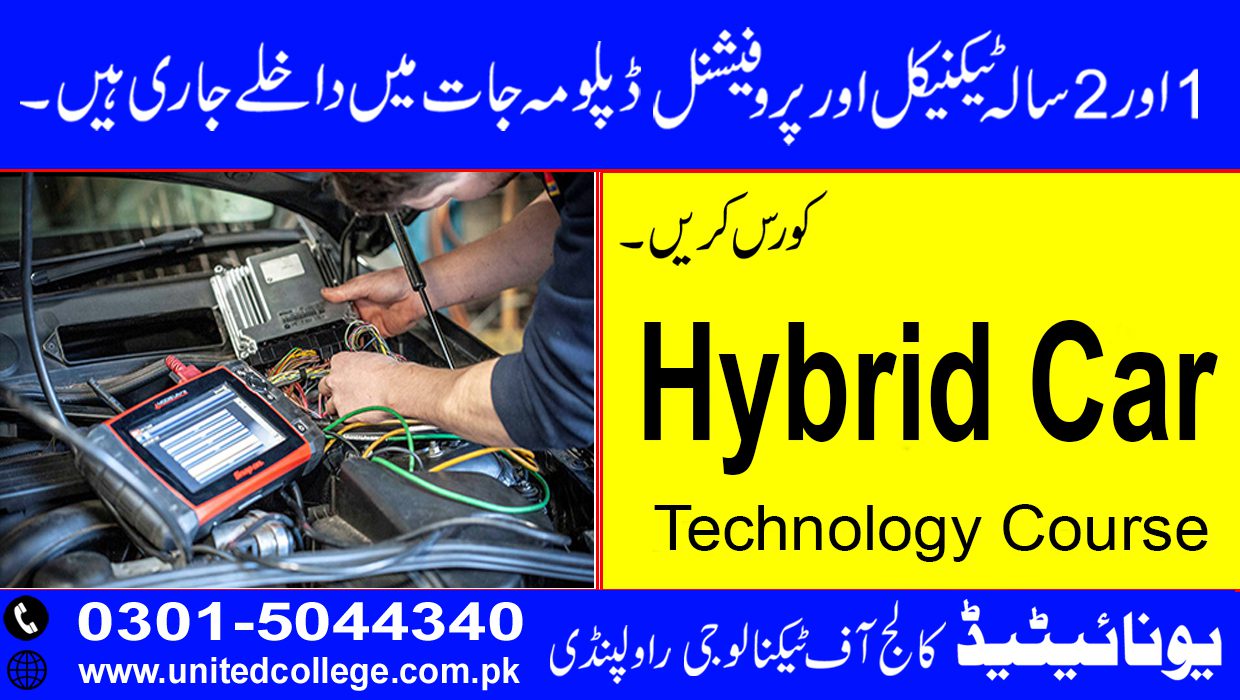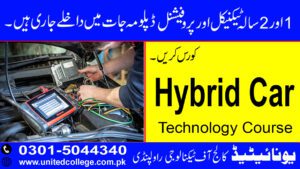
Hybrid Car Technology Course in Rawalpindi Islamabad 0301-5044340
Introduction
A Hybrid Car Technology Course in Rawalpindi and Islamabad is a cutting-edge training program designed to provide individuals with a deep understanding of hybrid vehicle technology, a field rapidly gaining prominence in the automotive industry. Hybrids represent a significant leap in the quest for more sustainable and fuel-efficient transportation, making this course indispensable for aspiring automotive technicians, engineers, and enthusiasts. This course offers a comprehensive educational journey that explores the innovative hybrid powertrain systems, regenerative braking, and advanced energy management technologies that define these vehicles. Students gain valuable insights into the environmental benefits, energy efficiency, and unique features that set hybrid cars apart from traditional vehicles.
In the introductory phase of the course, students typically acquire a foundational understanding of hybrid vehicle technology. They explore the principles that underpin hybrid systems, including the combination of internal combustion engines and electric motors, as well as the significance of energy recovery and storage. The course provides a historical context, detailing the evolution of hybrid technology and its relevance in today’s automotive landscape.
The course content goes on to delve into the core components of hybrid vehicles, such as the hybrid powertrain, high-voltage batteries, and regenerative braking systems. Participants gain insights into how these elements work together to optimize fuel efficiency and reduce emissions. They also explore the diversity of hybrid configurations, from mild hybrids to plug-in hybrids, and the advantages each offers.
One of the highlights of the course is hands-on experience with hybrid vehicle systems, which may include disassembling and reassembling hybrid powertrains, diagnosing common issues, and practicing safety protocols for working with high-voltage systems. Students are also introduced to advanced diagnostic tools and software used to maintain and service hybrid vehicles.
As the course progresses, students delve into hybrid vehicle maintenance and repair, with a focus on preventive measures and troubleshooting techniques. They learn about the unique challenges associated with hybrid technology, including high-voltage safety procedures and the importance of certified technicians.
The course also emphasizes environmental stewardship and sustainable practices within the automotive industry, encouraging responsible management of hybrid vehicle systems and their impact on the environment.
Course Content:
Here’s a sample course outline that includes key areas of study:
Module 1: Introduction to Hybrid Vehicle Technology
- History and evolution of hybrid technology
- The significance of hybrid technology in the automotive industry
- Comparison between traditional vehicles and hybrid vehicles
- Environmental benefits of hybrid technology
Module 2: Hybrid Vehicle Components
- Overview of the hybrid powertrain
- Hybrid internal combustion engines (ICE)
- Electric motors and their functions
- High-voltage battery systems
- Regenerative braking systems
Module 3: Types of Hybrid Vehicles
- Mild hybrids, full hybrids, and plug-in hybrids
- Series and parallel hybrid configurations
- Advantages and disadvantages of different hybrid types
Module 4: Hybrid Vehicle Operation
- Power flow in hybrid systems
- Modes of operation (electric-only, hybrid, and regenerative)
- Fuel efficiency and emissions reduction in hybrids
- Energy management and control systems
Module 5: High-Voltage Safety and Maintenance
- High-voltage safety protocols
- Safety equipment and procedures
- Maintenance and servicing of hybrid components
- Handling high-voltage batteries and safety precautions
Module 6: Hybrid Vehicle Diagnostics and Troubleshooting
- Introduction to hybrid vehicle diagnostic tools
- Diagnosing common issues in hybrid systems
- Identifying and resolving performance and drivability problems
Module 7: Hybrid Vehicle Maintenance and Service
- Preventive maintenance for hybrid vehicles
- Scheduled service procedures
- Oil changes, air filter replacements, and other routine tasks
- Inspection and maintenance of hybrid batteries
Module 8: Hands-On Practical Workshops
- Disassembly and reassembly of hybrid powertrain components
- Hands-on experience with hybrid vehicle systems
- Safety procedures for working with high-voltage systems
- Use of diagnostic tools and software
Module 9: Environmental and Sustainability Considerations
- The role of hybrids in reducing carbon emissions
- Recycling and disposal of high-voltage batteries
- Sustainable practices in hybrid vehicle maintenance and repair
Module 10: Final Assessment and Certification
- Written and practical examinations
- Evaluation of hands-on skills and knowledge
- Certification as a qualified hybrid vehicle technician
Course Fee
Duration 3 Months
Fee 40,000

Coming Soon
Coming Soon

